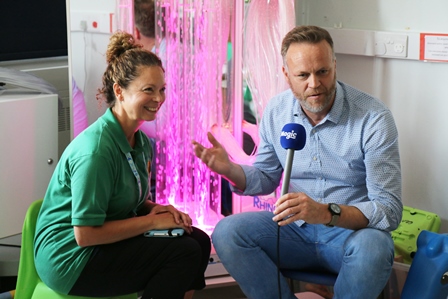Bringing a little magic to the children at St George’s
Magic FM brought their own little bit of magic when they visited St George’s Paediatric unit to see the sensory play trolley bought by them for the ward. When they saw the joy and happiness it brought to kids on the ward they were so impressed that they promised to fundraise for a second trolley. The trolley is a special piece of equipment which has large air flow tube which change colours and has coloured fibre optic lights, there is also a projector that can be focused on the ceiling so even if a child is prostrate they can still see lovely colourful pictures. The trolley is usually stationary in the central play room but can be wheeled to a bedside so that the child can experience it close up. The play specialists are often called to wheel the trolley down to the PICU unit as it has been proved to be very helpful in re-assuring and relaxing children. A second trolley will allow the team to expand upon the support they can give to the children in different settings.
Lisa Lewington, Senior Play Specialist spoke at length to Nick Snaith, presenter of the Breakfast Programme about how valuable the trolley had been to help kids and families. She said, “Our main role is to help kids understand what is happening and going to happen to them in a way that they can cope with all procedures. We offer preparation and will show them a photo story board which describes what will happen to them, for example, if they are going have an operation we can show them a picture of the cannula tube they will get in their hand for the anaesthetic. We often use role play with dolls and teddies and act out what it is like to have an operation and what it will be like after the operation. The most important thing is that the child feels calm and reassured and it is here that the sensory trolley comes into its own. Our medical teams often monitor breathing and heart rate and they can see the difference the sensory trolley makes to children. They visibly relax as they watch the colours change and have the fibre optic lights around them.
Members of the Play service, who are trained in looking after children with complex medical needs, need to know about diseases and treatments as one of their main roles is explaining to children what will happen to them while they are in hospital. Lisa said, “Parents notice the difference play specialists make to their child and ask us to teach them the techniques we use so that they can re-assure their child while they are in the hospital or when they go home”.


